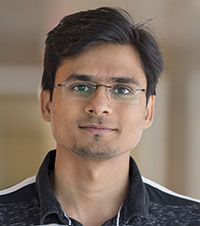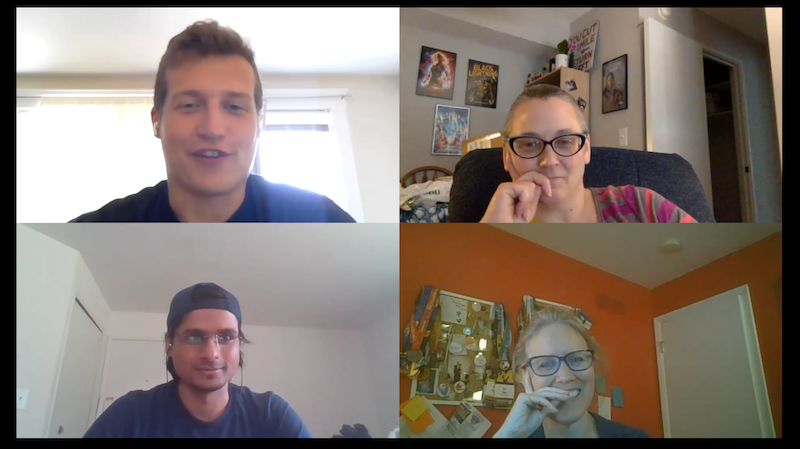
Let us start this blog the usual CHEPS kickoff way. Hi, my name is Pushpendra Singh, you can call me Ishu. I am a recent graduate of U of M, with a master’s in Industrial and Operations Engineering along with a graduate certificate in Computational Discovery and Engineering. I come from a small town of Faizabad in India. I have been with CHEPS for a year now. As a child I was ambidextrous. That’s it, that is a standard CHEPS introduction.
Let me take you back to the time when I was still in India and still had not resigned from my full-time job as an SAP consultant. From all the offers I had for pursuing my masters, I had chosen Michigan and was waiting for my visa. I got an email from the department suggesting I consider the HEPS program. I was sure I wanted to go into optimization research but was not sure what would be my field of application. I ignored the email and I still regret it. Fast forward to my first summer, while I was working with Prof. Viswanath and I met Karmel. I told her about my application to CHEPS and my penchant for healthcare and aviation, she told me all about the lab and its environment. That was the moment I knew that I was in for a treat.
I still remember the first day when I was in the CHEPS building to meet Dr. Amy. I was all up for answering the technical questions. Although that did happen, it was more about me telling her about myself. There was a welcoming feel in that meeting. While Dr. Amy was giving me a tour of the workspace, I saw a lot of students around. Now I am one of those people who cannot walk up to someone and introduce myself, forget about striking a conversation. I would usually find the corner and keep to myself even when I want to talk. But that is where CHEPS is very very unique, people are friendly and make you feel at home.
In CHEPS, I got to work on simulation-based projects like system concepts for optimization and personalization of endoscopy, specialty access, and simulation core code. These projects helped me understand the crucial role operations research techniques play in one’s real life and how powerful they are. I learned how an integrated tool for simulating the scheduling and clinical operations is important to determine the effects of patient preferences, scheduling policies, waiting time, overtime, and idle time. I am super thrilled to be presenting the work at the IISE conference this year. With COVID-19 interrupting the day to day operations of the clinics, the telephone and video appointments that we studied in the specialty access project just made me realize how super practical the things I have been involved in while being at CHEPS are.

With the enriching experience of research in healthcare, now that I am starting my Ph.D. at Dartmouth College in Operations Research, I cannot imagine myself doing anything but research. My love for airports has finally been incorporated in my academic life as well, as the first project that I am undertaking as a Ph.D. student is about airlines’ passenger delay analysis. The central theme of my research is going to be the study of airline scheduling and passenger delay analysis and healthcare analysis. Thanks to Dr. Amy and CHEPS, I am not completely new to them, which provides me with a good launching pad to start with.
I cannot stop myself from mentioning how many good students/colleagues I met at CHEPS. Jake (we worked together for a year, one of the nicest and calmest footballers I ever met), Nick, Tarek, Jordan, Jacob, Carolyn, Samir, Vai, and Che-Yi were all super cool. I must specially mention Adam, for all the mentoring he did for me while I was preparing my Ph.D. applications; all his suggestions were very great. I look forward to calling him Dr. Adam soon and hope to keep getting advice from him in the future. The summer at CHEPS was very different due to COVID but, with all the lunch club activities, it was still delightful. I enjoyed taking on the journal club and presenting the paper I read every week to the audience that was super eager to learn.
CHEPS is what a top-notch lab should be, not just in its work but with its welcoming environment. You can find many labs with great research work but believe me it is very hard to find a lab that is equally good in research and is welcoming as well. It helped me find a great lab here at Dartmouth as well (all thanks to Dr. Amy). If you are mentally struggling, stop at CHEPS, it will heal you. Talk to people, you will be encouraged. If you think you cannot do two things at once, many athletes at CHEPS do research along with sports regularly, you will get a new sense of encouragement from seeing them. CHEPS has laid a great foundation of research for me and it does the same for others as well. If you are at U of M, it is a place to visit.
Now that I am at Dartmouth, I am going to miss being a regular at CHEPS. I am going to miss brainstorming sessions with Dr. Amy and her words of wisdom as well as an extremely intelligent sense of humor. I will miss waking up to Liz’s email with a punch of cat memes. And everything else as well. But as we say, “you never really leave CHEPS.” I am looking forward to the wonderful in coming years.
